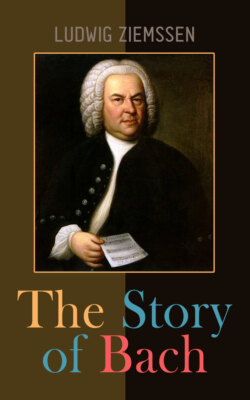Читать книгу The Story of Bach - Ludwig Ziemssen - Страница 4
На сайте Литреса книга снята с продажи.
Translator’s Preface
ОглавлениеTable of Contents
There is no person in musical or general history whose life can be studied by young people with more advantage, or followed in its general characteristics with more profit than Johann Sebastian Bach. The old saying that genius is only the highest capacity for work has sometimes been attributed to him. Whether he originated the saying or not, his life illustrates its truth. His industry was astonishing, whether in adverse or prosperous circumstances, though his remuneration, considering the magnitude of his achievements, now seems a beggarly pittance. He worked for the highest in his art, and always with the utmost of his ability, and consecrated his work to the divine honor. Upon all his important pieces he inscribed the letters, “S. D. G.” (“Soli Deo Gloria”), “to the glory of God alone.” What the simple, God-fearing, art-loving cantor of Saint Thomas accomplished, the world knows. Gounod summed it up in the declaration that if all the music written since Bach’s time were lost, it could be reconstructed upon what he wrote. His life was as noble as his music. He was an affectionate father, laboring manfully and incessantly to support his large family; a good citizen, faithfully fulfilling his duties and commanding universal respect; a musician without an equal in the profundity of his knowledge and the richness of his productions; the founder of modern music, the master of the organ, the composer of the highest forms of sacred music; a plain, humble man, despising rank and show, making no boast of his grand achievements, and yet recognized in the court of Frederick the Great as above courtiers and nobility by the title of his genius. “Seest thou a man diligent in business; he shall stand before kings.” He was a self-reliant, self-sustained, evenly poised man, plain and unostentatious in his bearing, honorable in his intercourse with men, strong and unvarying in his home love, and guided in every event of life by a strict morality born of sincere religion. He followed the bent of his genius untrammelled by the accidents or troubles of life, and sought for no higher reward than his own conviction of the worth of his accomplishments. Such a life is to be commended not only to the young student entering upon the profession of music, but to every young person entering upon the duties of life. This little volume, therefore, worthily claims a place among “Life Stories for Young People.” Though the original is inaccurate in some small details, which later biographers have corrected, the general story of his life is reliable and nearly every event of importance is included in its pages.
G. P. U.
Chicago, 1905
